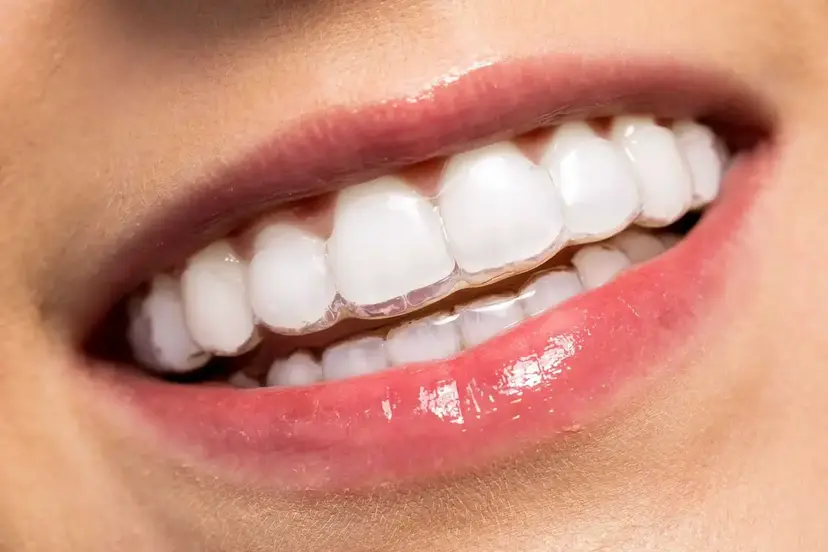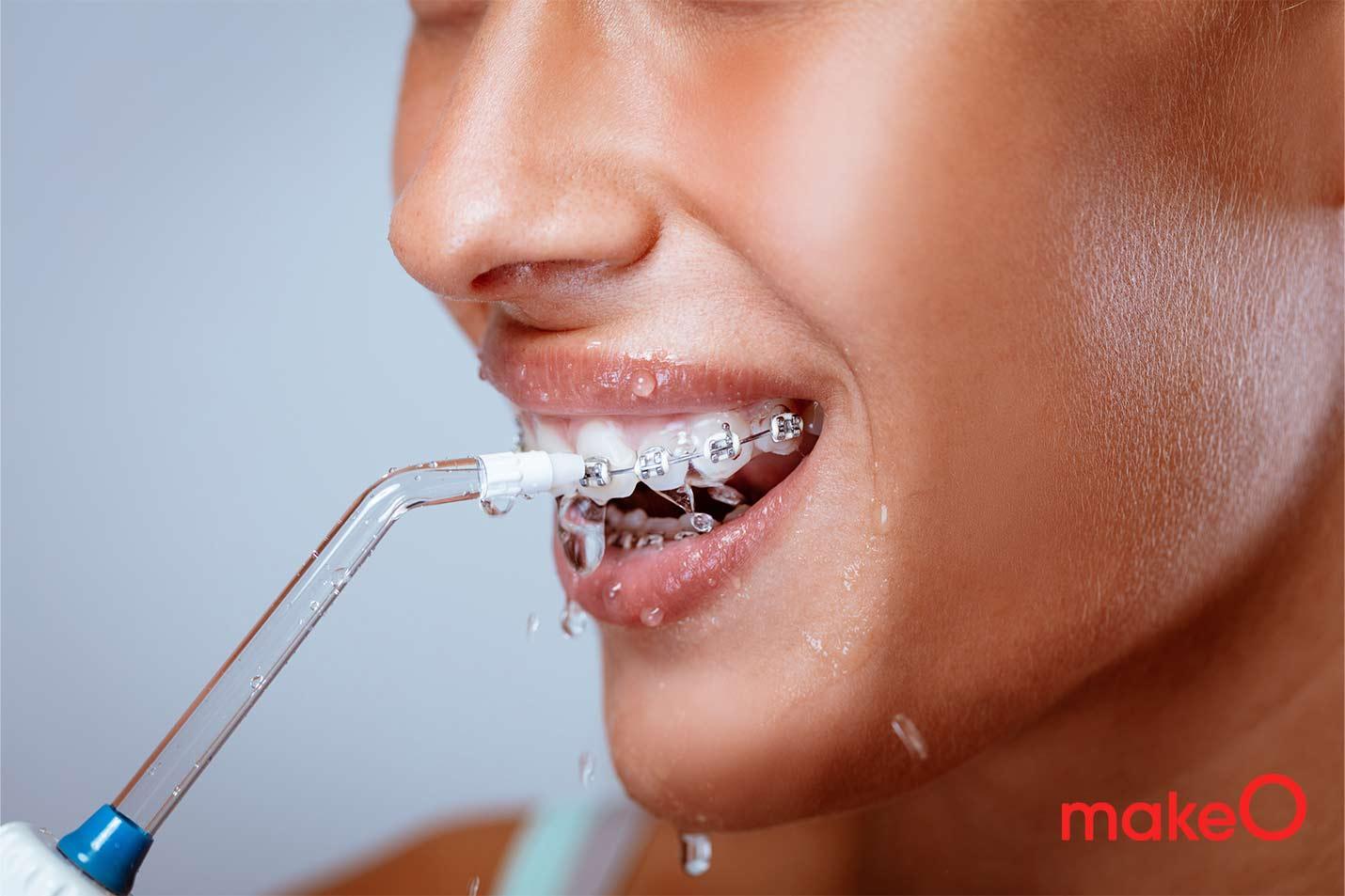MakeO blog
Flossing has long been heralded as an indispensable part of oral hygiene. Dentists and oral health professionals emphasise its importance in removing food particles and plaque from between teeth, areas often missed by regular brushing.
While traditional string floss has been the go-to for decades, technological advancements in dental care have introduced a new player to the scene: the water flosser. This innovative device promises a simple approach to maintaining oral hygiene, offering an alternative to traditional methods. In this article, we will explore the pros and cons of water flossing, its benefits, and how it compares to conventional flossing techniques.
What is a Water Flosser?
A water flosser, sometimes known as a dental water flosser, is a handheld device that shoots a stream of water to clean between your teeth and below the gum line. Think of it as a mini irrigator for your mouth! Unlike traditional string floss, a water flosser for teeth uses a motor and pump to shoot water pressure at gaps and remove food particles and plaque.
Types of Water Flossers
There are mainly three types:
- Countertop water flossers: These are the most common and are usually plugged into an electrical outlet. Countertop flossers are the biggest and heaviest in size and feature a big irrigation tank.
- Cordless water flossers: Battery-operated and perfect for travellers or those with limited counter space. They are thin and portable in build.
- Faucet flossers: Attach directly to your tap, so no need for batteries or electricity.
Benefits of Water Flossers
Water flossing isn't just a trend; it's backed by some solid benefits:
1. Effective Cleaning
Water flossers can reach areas that traditional floss might miss, especially below the gum line and between tight teeth spaces. This ensures that hidden food particles and plaque are effectively removed, reducing the risk of cavities and gum disease.
2. Gentle on Gums
Unlike string floss, which can sometimes cause gum irritation or bleeding if not used correctly, water flossers provide a gentle cleaning experience. The water stream is soft on the gums, making it an excellent option for those with sensitive gums or gum conditions.
3. Braces-Friendly
For those with braces, cleaning around the brackets and wires can be a challenge. A dental water flosser simplifies this process, efficiently cleaning around orthodontic appliances and ensuring that no food particles remain trapped.
4. Eco-friendly
Traditional flossing often involves disposable floss picks or plastic containers. Water flossers, on the other hand, are reusable and reduce the amount of dental waste generated, making them a more environmentally friendly choice.
5. Time-saving
Once you get the hang of it, water flossing can be quicker than traditional flossing. Instead of meticulously threading floss between each tooth, a quick pass with a water flosser can achieve the same, if not better, results in less time.
6. Reduces Inflammation
Regular use of water flossers can help reduce gum inflammation and bleeding. The water stream not only cleans but also massages the gums, promoting better blood circulation and overall gum health.
7. Versatility
Many water flossers come with multiple tip options for different uses. Whether you need to clean around dental implants, or orthodontic appliances, or simply want a general clean, there's likely a tip designed for your specific need. This versatility ensures that every part of your mouth gets the attention it deserves.
Disadvantages of Water Flossers
While they sound amazing, there are a few cons to consider:
- Cost: They can be pricier than regular floss.
- Size: Countertop models can take up space in your bathroom.
- Maintenance: They need regular cleaning to prevent mold and bacteria buildup.
Is a Water Flosser Suitable for Me?
If you're someone who finds traditional flossing tedious or if you wear braces, a water flosser might be a great addition to your routine. Plus, if you're keen on trying innovative oral care products, you'll love the experience.
Choose makeO toothsi’s smart electric water flosser
Speaking of innovation, have you heard of the makeO toothsi smart electric water flosser? Not only does it offer the water flosser benefits we discussed, but it also comes with smart features to enhance your flossing experience.
makeO toothsi smart electric water flosser boasts 4 cleaning modes to choose from, an elegant travel-friendly body and a rechargeable battery. Using this flosser removes plaque, boosts gum health, and promotes better oral hygiene in a simple and quick way. So if you're looking to elevate your oral care game, this could be a fantastic choice.
Conclusion
Water flossing is more than just a fad. It's a revolutionary way to keep your teeth clean and gums healthy. Whether you're a teen looking to impress with a dazzling smile or an adult aiming for optimal oral health, using a water flosser can be a game-changer. And if you're considering investing in one, the makeO toothsi smart electric water flosser is worth checking out.
FAQs
Is water flossing as effective as traditional flossing?
While both methods have their merits, water flossing can reach areas that string floss might miss, especially around braces or dental work. Additionally, you are less likely to feel sensitivity or discomfort with a water flosser. Even with braces, you can floss away with ease when you use a water flosser!
How often should I use a water flosser?
Just like traditional flossing, it's recommended to use a water flosser once a day. For healthy and safe teeth, you can floss twice a day after brushing too!
Is a water flosser suitable for sensitive teeth?
Absolutely! It is common for many users to feel sensitivity when using string floss. Sometimes this can manifest into greater discomfort too. With water flossers, however, sensitive teeth users can comfortably clean their teeth without the worry of sensitivity as the device only uses water pressure.
How do I maintain my water flosser?
Regular cleaning is essential. Ensure you empty the water reservoir after each use and clean the device as per the product instructions. If you are buying a new water flosser, do some prior research and stick to the user guide to maintain your oral care device.
Which is the best water flosser for me?
While we can't label any product as the "best water flosser," the makeO toothsi smart electric water flosser is a fantastic option as it is portable, lightweight, travel-friendly, safe and easy. It also comes with four cleaning modes so you can floss the way you like!
related categories
Related articles

Types of Braces: Removable vs Fixed Braces, Which is Right For You?

This Diwali, Smile Bright With makeO Teeth Whitening Kit

Dr. Pravin Shetty: Pioneer in Lingual Orthodontics & Innovative Smile Solutions
How do I Know I’m the Right Candidate for makeO toothsi Teeth Aligners?

